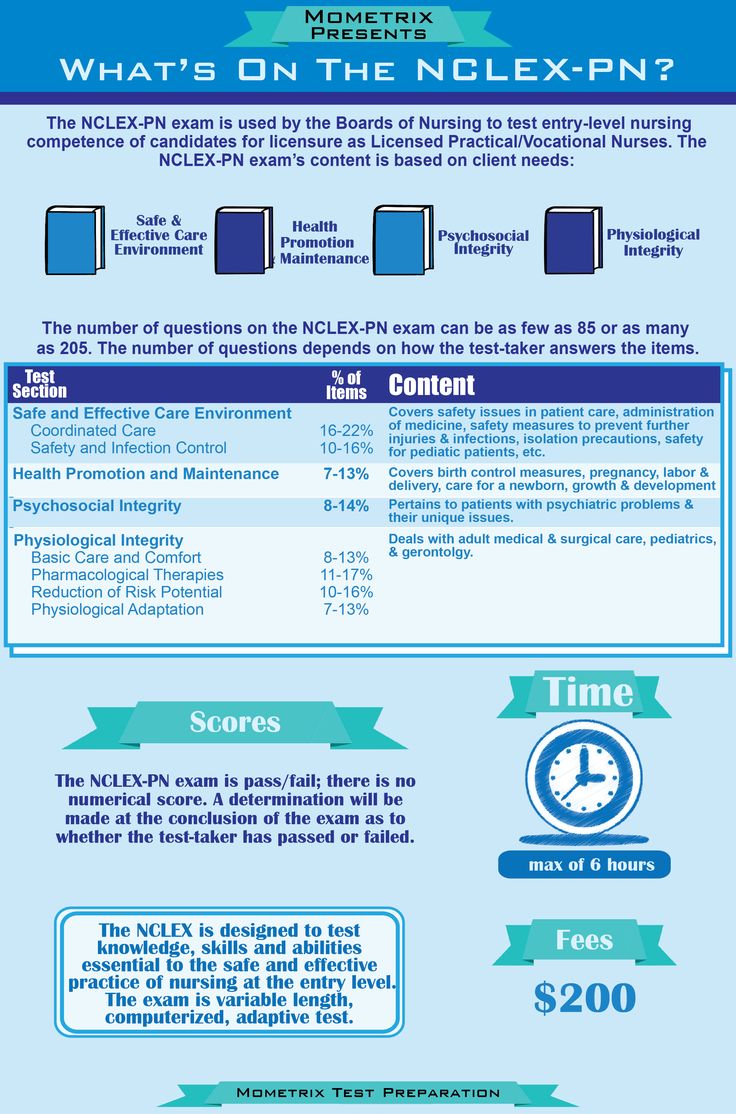
May 23, 2017 ● Kate Lopaze
The NCLEX: Everything You Need to Know
If you’re thinking about becoming a nurse, that’s great news. Nursing is a healthcare field that can always use more great, qualified professionals to keep up with ever-increasing demand.
 [via Elsevier]
[via Elsevier]

How Do I Become a Nurse?
Your first move will be completing a nursing education program. At a minimum, you’ll need certificate in Nursing (which takes about a year to complete) from an accredited school, but depending on your long-term nursing goals, an Associate’s or Bachelor’s degree might be the right first step. Associate’s Degree in Nursing (ADN): This is typically a two-year program offered by an accredited college or university. The program is targeted directly at the science and clinical skills you’ll need to get started as a licensed nurse. Bachelor of Science in Nursing (BS/BSN): This is a four-year degree offered by an accredited college or university. This degree provides a comprehensive background in the sciences (biology, chemistry, human growth and development, anatomy and physiology, psychology, and nutrition, among others), as well as nursing theory and humanities. Students also learn the necessary clinical skills. After practicing in the field, some nurses opt to pursue a Master of Science degree in Nursing (MS/MSN), Doctor of Philosophy degree in Nursing (PhD), or a Doctor of Nursing Practice degree to prepare for advanced, research, or leadership roles. As you finish your education, you’ll also need to decide whether you’d like to become a licensed Registered Nurse (RN) or Practical Nurse (PN). What’s the difference between those, you ask? RNs typically have an AS degree or a BS degree in nursing. RNs are found anywhere there are nurses, but are usually employed in hospital or clinical settings. Their many duties include:- Administering medications and treatments to patients
- Coordinating care plans
- Performing diagnostic tests
- Educating patients on care
- Overseeing medical teams
- Checking vital signs
- Inserting catheters
- Assisting patients with daily tasks and self-care
How Do I Get Licensed?
Every state requires its nurses to be certified and licensed, so once you’ve got your completed degree in hand, you’ll need to go through the certification process. The National Council of State Boards of Nursing (NCSBN) requires prospective nurses to pass one of two National Council Licensure Examinations (NCLEX): the NCLEX-RN or the NCLEX-PN.The NCLEX-RN Test
The NCLEX-RN is a test required for Registered Nurse (RN) candidates. The NCLEX-RN is designed to test the knowledge, skills and abilities essential for entry-level nurses. It is a computer-adaptive test (CAT), meaning there are no pencil-and-paper test booklets to be found. Test takers sit for the exam at dedicated testing centers, and answer questions entirely on screen. Most questions are multiple-choice, though there may also be questions that call for multiple responses, responding to a chart or other visual element, fill-in-the-blank, or responding to an audio clip. The questions are drawn from a bank that covers these areas:- Safe and Effective Care Environment
- Management of Care
- Safety and Infection Control
- Health Promotion and Maintenance
- Psychosocial Integrity
- Physiological Integrity
- Basic Care and Comfort
- Pharmacological and Parenteral Therapies
- Reduction of Risk Potential
- Physiological Adaptation
 [via Elsevier]
[via Elsevier]
The NCLEX-PN Test
The NCLEX-PN is a test required for Licensed Practical Nurse (LPN) candidates. The NCLEX-PN is designed to test the knowledge, skills and abilities essential for entry-level nurses. Like the NCLEX-RN, it is a computer-adaptive test (CAT), so you can toss your number 2 pencils. Also like the NCLEX-RN, most questions are multiple-choice, though there may also be questions that call for multiple responses, responding to a chart or other visual element, fill-in-the-blank, or responding to an audio clip. The questions are drawn from a bank that covers these areas:- Safe and Effective Care Environment
- Coordinated Care
- Safety and Infection Control
- Health Promotion and Maintenance
- Psychosocial Integrity
- Physiological Integrity
- Basic Care and Comfort
- Pharmacological and Parenteral Therapies
- Reduction of Risk Potential
- Physiological Adaptation

How Do I Register for My NCLEX?
The NCLEX has a two-step registration process.- Submit a licensing application to your state’s Board of Nursing. This step is necessary for you to be eligible to sit for the NCLEX. If you register for the test but forget to first submit your application, your registration will be active for a
- Register online with the test maker’s site, or by phone.


